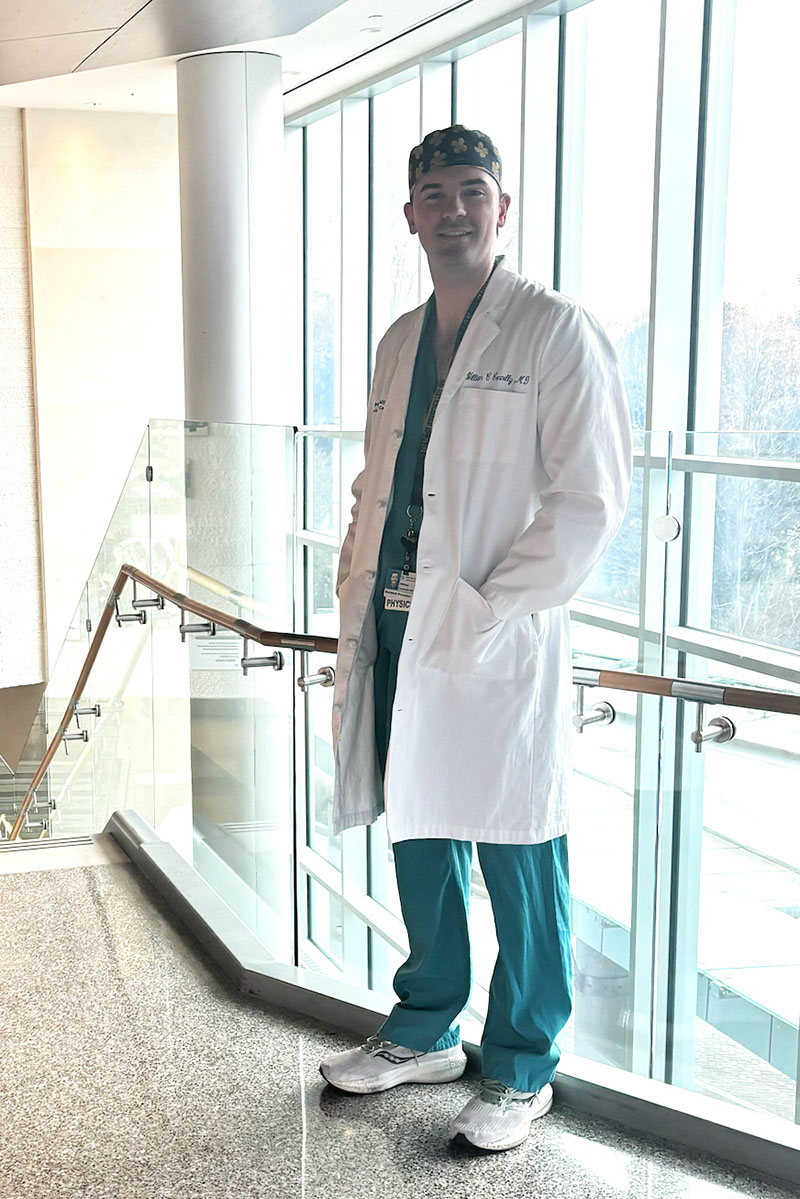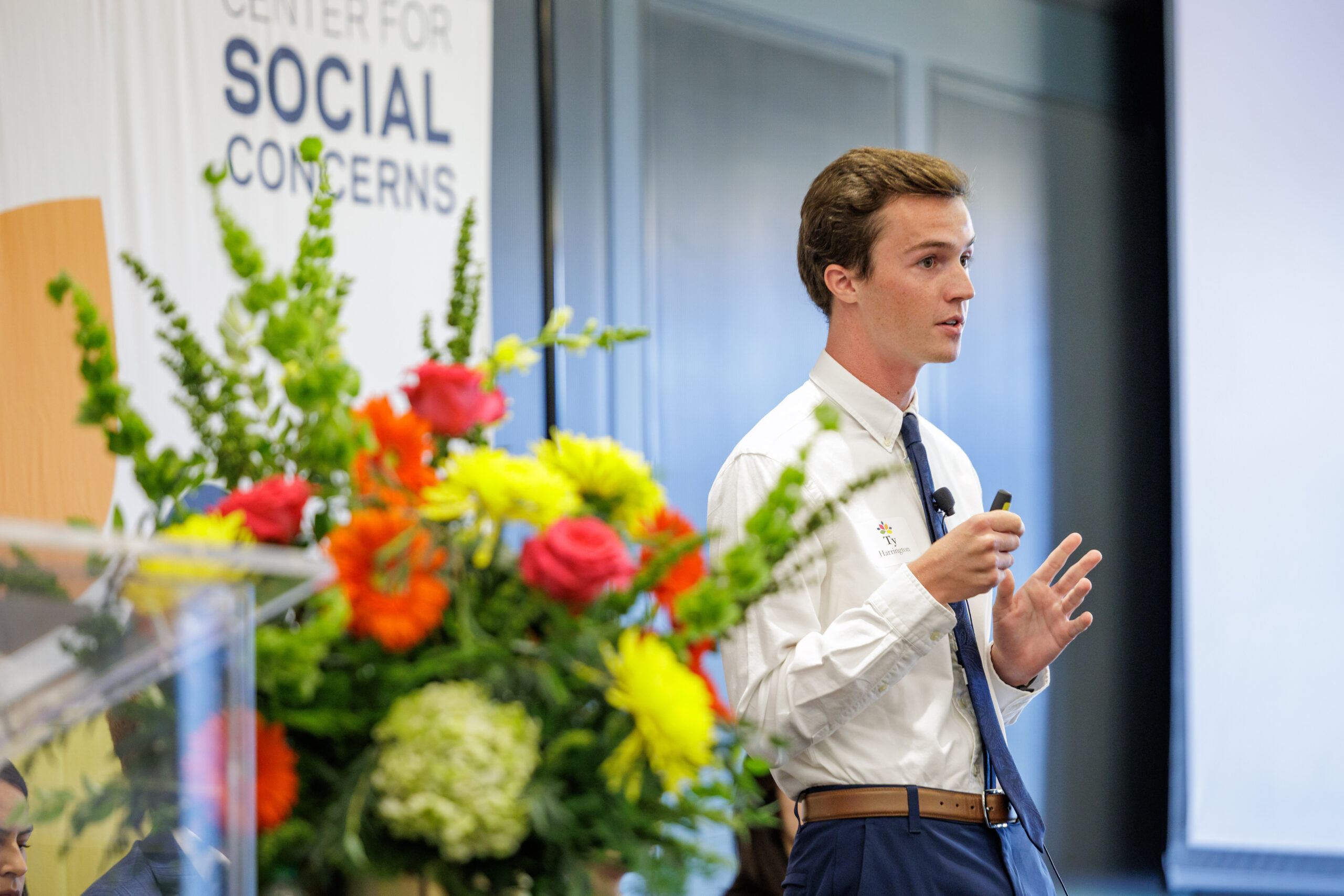Making their minors major
November 27, 2024
Notre Dame students take many paths to the Institute for Social Concerns.
They come from across campus with their aspirations for medical school, Ph.D. programs, and careers in engineering, finance, or the arts. But they also come with a desire to better understand issues of justice and learn how to accompany people who have been marginalized.
The same goes for the two minors housed at the institute: the Catholic Social Tradition Minor and the Poverty Studies Interdisciplinary Minor. The minors welcome students from all of the University’s colleges and schools to enrich the education they’re receiving through their majors and to see more clearly how they can apply their career to the cause of justice.
Both minors require students to complete 15 credits of interdisciplinary study with courses that draw upon a wide variety of fields. Students also complete a final capstone project that synthesizes what they’ve learned.
Meet a couple of alumni who have minored in Catholic social tradition or poverty studies, and see how their education and experiences through the Institute for Social Concerns influenced the direction of their careers and their approach to the work they do.
Emily Clements ’18, ’23 Ph.D.
Major: Chemical Engineering
Minor: Catholic Social Tradition Minor
Students in the Catholic Social Tradition Minor gain a deeper understanding of justice through CST concepts such as the common good, rights and responsibilities, option for the poor, human dignity, subsidiarity, and peace.

Emily Clements said those concepts tie into every field of study.
“I think the CST Minor is a great complement to any major because it reframes the ‘why,’” said Clements, a 2018 Notre Dame graduate who majored in chemical engineering and went on to earn a master’s and Ph.D. in environmental engineering, also from Notre Dame.
“The CST Minor stresses that, instead of focusing on the most prestigious careers, we should prioritize our communities,” she said. “For me, that was environmental stewardship. The minor was a huge influence on my decision to switch from chemical engineering for my undergrad major to environmental engineering for my master’s and Ph.D.”
Clements also became involved with the Catholic Worker movement — a perfect example of a community inspired by the principles of Catholic social tradition.
She spent one summer during her undergrad years at St. Peter Claver Catholic Worker in South Bend through an Institute for Social Concerns summer program. She later helped organize and raise money for solar panels to be installed on the roof of Our Lady of the Road, a house of hospitality and grocery co-op affiliated with the Catholic Worker. After earning her bachelor’s degree, she moved into St. Peter Claver for 18 months and continued to serve as a staff member there throughout her years as a Ph.D. student at Notre Dame.
These days, Clements is a postdoctoral researcher with the Southern Nevada Water Authority, where she develops and uses models to assess and improve water quality.
A key thesis of Catholic social tradition is that the pursuit of truth, the life of faith, and the practice of social justice can be essential elements of any profession, not only for those who have made a formal commitment to ministry. Clements holds on to that idea in her vocation as an engineer. “I do environmental engineering, focused on water quality and pathogen risks, but I stay involved in my community,” she said.
Will Connolly ’20
Major: Neuroscience and Behavior
Minor: Poverty Studies Interdisciplinary Minor
The Poverty Studies Interdisciplinary Minor asks students to examine the nature, causes, and consequences of poverty, injustice, and oppression from multiple perspectives. And, importantly, the minor does this not only through class sessions and coursework but also by exposing students to community-engaged learning where they encounter people experiencing and addressing poverty firsthand.

Will Connolly, a 2020 Notre Dame graduate, is now a surgical resident at Lankenau Medical Center near Philadelphia. He said minoring in poverty studies enabled him to connect with the service aspect of his vocation in medicine.
“While the majority of my undergrad classes focused on sciences as I prepared for medical school, my poverty studies curriculum ensured I could create an academic backbone for an endeavor just as important to me — service,” Connolly said.
He spent one summer at the Roanoke Rescue Mission in Virginia through an Institute for Social Concerns summer program, and continued to serve the unhoused in medical school through JeffHOPE, a free clinic run by medical students at homeless shelters in Philadelphia.
“My experiences at the Institute for Social Concerns gave me the ability to zoom out and garner a wider perspective on how the field of neuroscience, and medicine, impact society on a bigger scale,” Connolly said.
For example, he said he still thinks a lot about what he learned as a poverty studies minor and how that academic background prepared him to look for the ways that social determinants of health impact his patients.
“At Notre Dame, my faith grew immensely, as did my passion for service. The poverty studies minor and Institute for Social Concerns had a lot to do with that,” he said. “As a surgical resident, the ethos I cultivated at Notre Dame leads me to see my patients in a holistic manner — and allows me to be intentional about treating more than just their disease.”
Learn more about the Catholic Social Tradition Minor and the Poverty Studies Interdisciplinary Minor.
Related Stories
-
ReSearching for the Common Good: Jenifer Guadalupe Solano Becerra
-
Engaging South Bend—University faculty explore research collaborations with regional organizations through institute’s Engage South Bend tour
-
Two paths, one destination—Postbaccalaureate research fellows join the institute to research mass incarceration
-
Extraordinary good for this world—Researching for the Common Good Symposium celebrates undergraduate summer research
-
Social Concerns Summer Fellow returns to India for ongoing research





